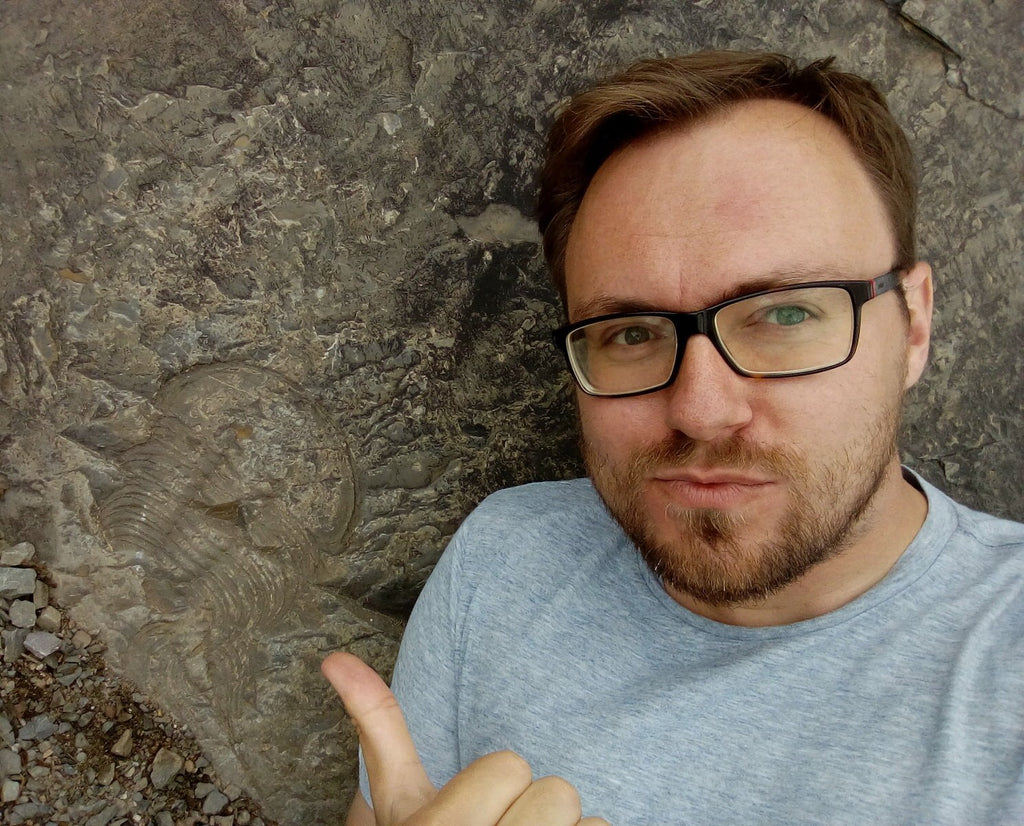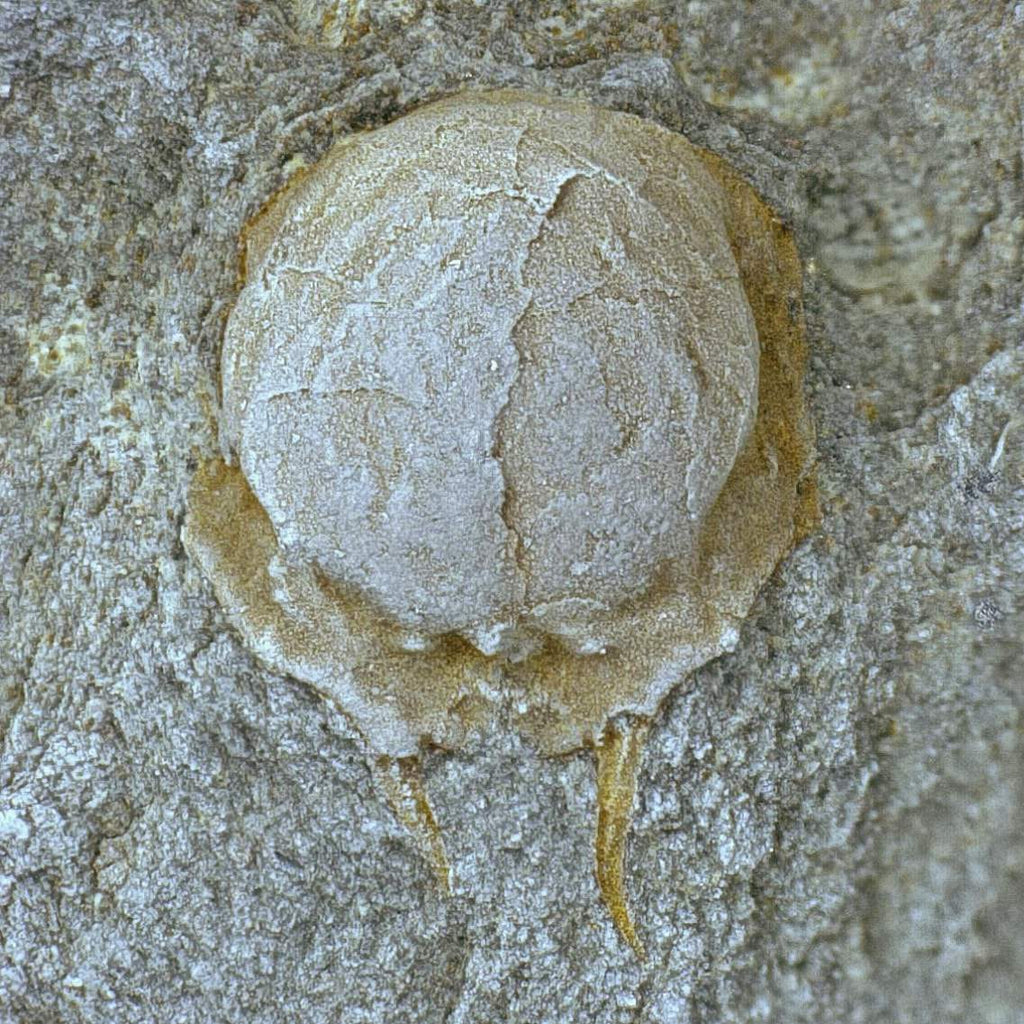Unveiling the World of Trilobites: A Conversation with Dr. Lukáš Laibl
 Dr. Lukáš Laib in the Fezouata lagerstätte near Zagora, Morocco. Credit: Martina Nohejlová.
Dr. Lukáš Laib in the Fezouata lagerstätte near Zagora, Morocco. Credit: Martina Nohejlová.
Czech paleontologist Dr. Lukáš Laibl shares wide ranging tips for anyone interested in the study of fossils. His dedicated research about trilobite development and evolution (and trilobite larvae in particular) provides a glimpse into the excitement of discovering unexpected facts about the prehistoric past. Dr. Laibl’s road to a career in paleontology was heavily influenced by natural history books and he was happy to recommend several books and resources for fellow enthusiasts and aspiring paleontologists.
Can you describe your first experience encountering or collecting a fossil?
I grew up near the Czech city of Pilsen (known for pilsner beer). The underlying rocks of Pilsen are Carboniferous sediments of the Pilsen Basin. The succession yields several coal horizons that were mined in the past so there were plenty of spoil tips with fossiliferous rocks around these old mines. I collected my first fossil in one of these tips when I was about 12 years old. I remember that the most impressive moment for me was when I split a big slab of siltstone and discovered a beautifully preserved leaf of Pecopteris!
Who or what inspired you to pursue a career in paleontology?
When I was young I got two books from my grandparents - A Practical Guide for the Amateur Naturalist and My Family and Other Animals written by the famous British naturalist Gerald Durrell. I decided to become a naturalist like him. Since I was living in the countryside, I started to collect beetles, plants, rocks and other stuff. I also liked dinosaurs like most of the kids. When I grew up, I came across books from Stephen Jay Gould. Eventually I ended up studying geology in the Faculty of Science at Charles University in Prague.
 A fun selfie shot with a large Wanneria trilobite, Gros Morne National Park, Newfoundland. Credit: Lukáš Laibl
A fun selfie shot with a large Wanneria trilobite, Gros Morne National Park, Newfoundland. Credit: Lukáš Laibl
What topics in palaeontology do you find especially exciting? How did you get interested in these topics?
I started my university studies working on trilobite development. I liked trilobites because they show many interesting morphological features and they are quite abundant in the fossil record. Thanks to trilobites, I also became more interested in other arthropods. For me, the most exciting topic in palaeontology is the evolution and development of arthropods.
Where have you conducted fieldwork?
My research is primarily based on the specimens stored in museum collections. During nearly two hundred years of palaeontological research, natural history museums usually have portions of their collections that have not been reviewed and need to be studied. I have also conducted fieldwork mainly in the Czech Republic (Příbram-Jince Basin, Skryje-Tyřovice Basin and Prague Basin), but also in Spain (Cantabrian Mountains). Most recently, I explored fossils in western Newfoundland. I also visited some of the famous lagerstätte, such as Doushantuo Formation, Maotianshan Shales, and Kaili Formation or Fezouata Formation.
What is the most exciting discovery that you or your team have unearthed and how is it significant?
The most exciting discovery was when we found gigantic trilobite larvae and described potential relationships between larval size and their palaeogeographic distribution (here is the original research article).
I remember that I had to take several photos of the larvae in different microscopes, because I simply didn't believe they could be so big (about 2 mm). I thought the scale of the microscope was wrong. This discovery is significant because it suggests that already in the Cambrian Period some arthropod larvae developed very specific adaptations that were related to the environment.
 Trilobite larva - protaspid stage of Hydrocephalus carens. Credit: Lukáš Laibl.
Trilobite larva - protaspid stage of Hydrocephalus carens. Credit: Lukáš Laibl.
What do you hope to accomplish with your research?
Despite numerous papers about trilobites that have been published so far, we still have quite limited knowledge about their postembryonic development and phylogeny. I believe that with our research we can enrich such knowledge. Trilobites, due to their abundance in the fossil record, are also ideal model organisms for testing various evolutionary or ecological hypotheses. So we are also collecting data to test some of these hypotheses.
Do you have any future projects planned?
Currently, I successfully finished my PhD and got a postdoctoral position in the University of Lausanne that is focused on fossil arthropods. My future projects will, of course, depend on the objectives of this position. However, with my colleagues we still have plenty of unpublished data about trilobites that are waiting for analysis.
How might new technologies advance the field?
We now have better and better imaging techniques, such as high resolution microscopy, elemental mapping or computed tomography, so depending on the preservation, we can extract much more detailed data from fossils than before.
How do you envision the future of palaeontology?
I hope that there will be new detailed studies focused on diversity changes, phylogeny, palaeoecology, mass extinction and so on. I also hope that the palaeontology of the future will also remain focused on descriptive work, taxonomy, systematics, etc., because such studies provide the fundamental data for nearly all subsequent analysis.
What books would you recommend to people who are interested in gaining a deeper understanding of palaeontology?
A brilliant book about palaeontology and fossils is Introduction to Palaeobiology and the Fossil Record from Benton and Harper, or Palaeobiology: A Synthesis edited by Briggs and Crowther. Also it is worth reading some books about scientific methodology (e.g. Scientific Method in Practice by Gauch) or data analysis (e.g. Paleontological Data Analysis from Hammer and Harper).
Can you offer some advice to aspiring palaeontologists?
Try to attend scientific conferences because they demonstrate how palaeontology is done by specialists and what the open questions are in particular topics. Be curious, open minded and try to think outside the box!
This interview has been edited and condensed.

